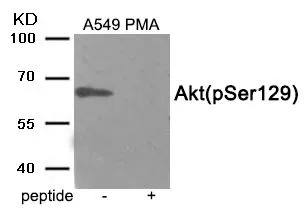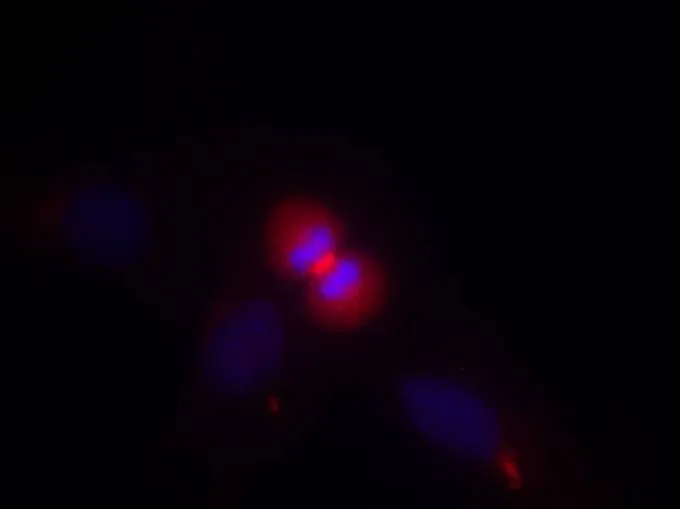AKT1 antibody
GTX110613
ApplicationsImmunoPrecipitation, Western Blot, ImmunoHistoChemistry, ImmunoHistoChemistry Paraffin
Product group Antibodies
ReactivityHuman, Mouse
TargetAKT1
Overview
- SupplierGeneTex
- Product NameAKT1 antibody
- Delivery Days Customer9
- Antibody SpecificityIP/MS validation was supported by references (PMID:30377404)
- Application Supplier NoteWB: 1:1000-1:10000. IHC-P: 1:100-1:1000. IP: 1:100-1:500. *Optimal dilutions/concentrations should be determined by the researcher.Not tested in other applications.
- ApplicationsImmunoPrecipitation, Western Blot, ImmunoHistoChemistry, ImmunoHistoChemistry Paraffin
- CertificationResearch Use Only
- ClonalityPolyclonal
- Concentration0.47 mg/ml
- ConjugateUnconjugated
- Gene ID207
- Target nameAKT1
- Target descriptionAKT serine/threonine kinase 1
- Target synonymsAKT; AKT1m; PKB; PKB alpha; PKB-ALPHA; PRKBA; protein kinase B alpha; proto-oncogene c-Akt; RAC; rac protein kinase alpha; RAC-ALPHA; RAC-alpha serine/threonine-protein kinase; RAC-PK-alpha; serine-threonine protein kinase; v-akt murine thymoma viral oncogene homolog 1; v-akt murine thymoma viral oncogene-like protein 1
- HostRabbit
- IsotypeIgG
- Protein IDP31749
- Protein NameRAC-alpha serine/threonine-protein kinase
- Scientific DescriptionThe serine-threonine protein kinase encoded by the AKT1 gene is catalytically inactive in serum-starved primary and immortalized fibroblasts. AKT1 and the related AKT2 are activated by platelet-derived growth factor. The activation is rapid and specific, and it is abrogated by mutations in the pleckstrin homology domain of AKT1. It was shown that the activation occurs through phosphatidylinositol 3-kinase. In the developing nervous system AKT is a critical mediator of growth factor-induced neuronal survival. Survival factors can suppress apoptosis in a transcription-independent manner by activating the serine/threonine kinase AKT1, which then phosphorylates and inactivates components of the apoptotic machinery. Multiple alternatively spliced transcript variants have been found for this gene. [provided by RefSeq]
- ReactivityHuman, Mouse
- Storage Instruction-20°C or -80°C,2°C to 8°C
- UNSPSC12352203
References
- STL1, a New AKT Inhibitor, Synergizes with Flavonoid Quercetin in Enhancing Cell Death in A Chronic Lymphocytic Leukemia Cell Line. Cervellera C et al., 2021 Sep 25, MoleculesRead more
- Copanlisib, a novel phosphoinositide 3-kinase inhibitor, combined with carfilzomib inhibits multiple myeloma cell proliferation. Okabe S et al., 2019 Mar, Ann HematolRead more
- A high-throughput pipeline for validation of antibodies. Sikorski K et al., 2018 Nov, Nat MethodsRead more
- MicroRNA-296 inhibits colorectal cancer cell growth and enhances apoptosis by targeting ARRB1-mediated AKT activation. Zhang Z et al., 2019 Jan, Oncol RepRead more
- Erythropoietin protects neuroblastoma cells against etoposide and vincristine by activating ERK and AKT pathways but has no effect in kidney cells. Vazquez-Mellado MJ et al., 2015 Sep 15, Life SciRead more
- A gene expression signature-based approach reveals the mechanisms of action of the Chinese herbal medicine berberine. Lee KH et al., 2014 Sep 17, Sci RepRead more
- The synthetic flavonoid WYC02-9 inhibits cervical cancer cell migration/invasion and angiogenesis via MAPK14 signaling. Chen YJ et al., 2013 Dec, Gynecol OncolRead more

![IHC-P analysis of human prostate carcinoma section using GTX02583 AKT1 antibody [rAKT1/2491].](https://www.genetex.com/upload/website/prouct_img/normal/GTX02583/GTX02583_20210319_IHC-P_1_w_23053122_113.webp)
![WB analysis of MCF-7 whole cell lysate using GTX02584 AKT1 antibody [AKT1/3898R].](https://www.genetex.com/upload/website/prouct_img/normal/GTX02584/GTX02584_20210319_WB_w_23053122_897.webp)
![Untreated (-) and treated (+) MCF-7 whole cell extracts (30 microg) were separated by 10% SDS-PAGE, and the membrane was blotted with AKT1 (phospho Ser124) antibody [GT1268] (GTX03180) diluted at 1:500. The HRP-conjugated anti-rabbit IgG antibody (GTX213110-01) was used to detect the primary antibody.](https://www.genetex.com/upload/website/prouct_img/normal/GTX03180/GTX03180_4000001526_20210716_WB_CIP_w_23053123_129.webp)
![IP analysis of MCF-7 cells using GTX10438 AKT1 antibody [PKB-175]. Lane 1 : IP from MCF-7 cells using10 microL antibody Lane 2 : IP from MCF-7 cells using10 microL nonrelevant antibody Lane 3 : MCF-7 whole cell lysate](https://www.genetex.com/upload/website/prouct_img/normal/GTX10438/GTX10438_20170605_IP_w_23060120_654.webp)

![IHC-P analysis of human pancreas tissue using GTX17956 AKT1 antibody [AKT1/2552].](https://www.genetex.com/upload/website/prouct_img/normal/GTX17956/GTX17956_20200115_IHC-P_840_w_23060620_764.webp)

![FACS analysis of A549 cells using GTX57714 AKT1 + AKT3 antibody [AT6D5]. Cell Number: 1 x 10? cells Red: Primary antibody Antibody amount: 2-5 microg](https://www.genetex.com/upload/website/prouct_img/normal/GTX57714/GTX57714_20200204_FC_w_23061123_621.webp)